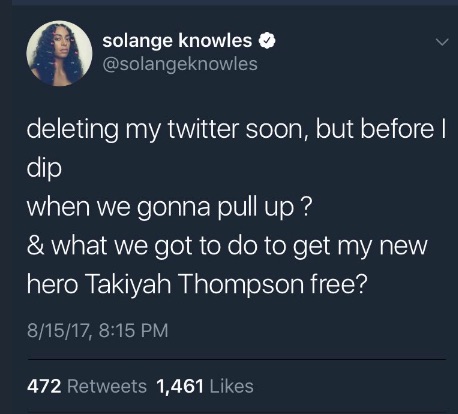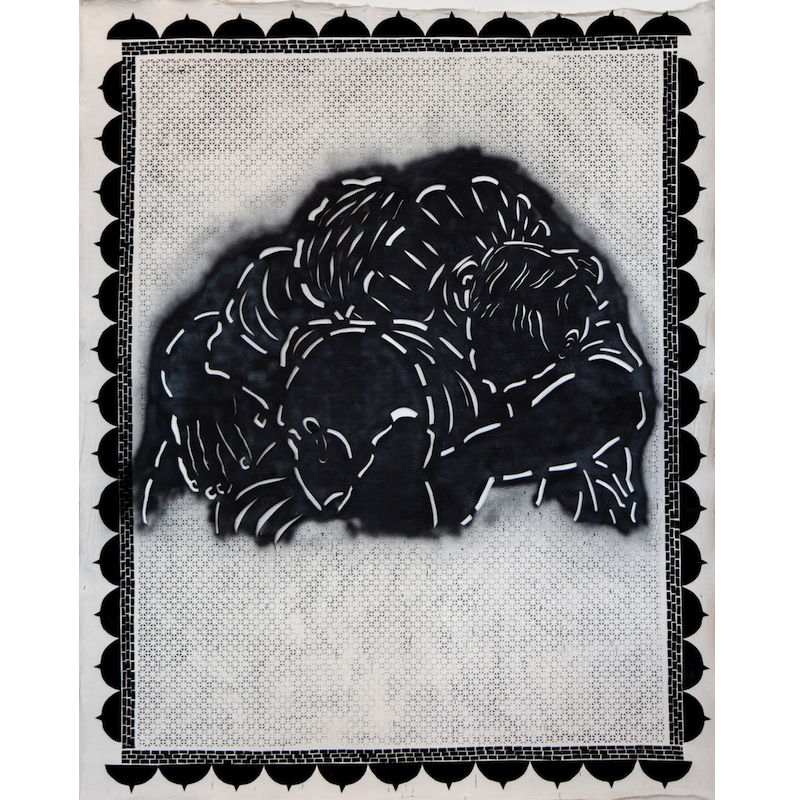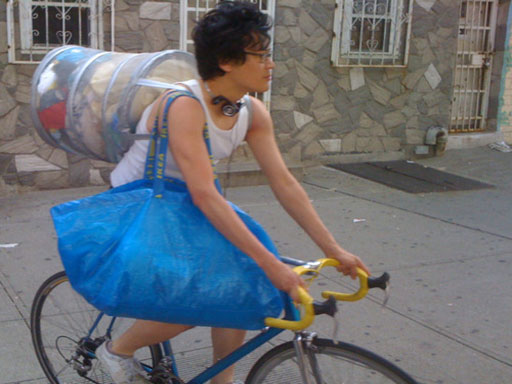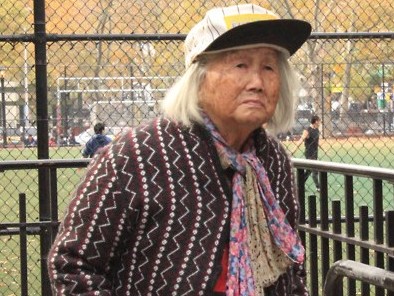Two Durham-based activists talk about pulling down Confederate statues, the poetry of displacement and war, and the sustained work behind every protest

January 11, 2018
Today, Takiyah Thompson and Loan Tran—along with other young activists who took matters into their own hands—are going to court for tearing down a Confederate statue in Durham, North Carolina on August 14. Their defense? Taking down a racist statue is not a crime.
Two days after a white nationalist drove his car into a crowd of protesters and killed Heather Heyer in Charlottesville, the militant Workers World Party (WWP) upped the ante by leading an effort to topple a Confederate soldier monument in front of the Durham County Courthouse. Reminiscent of Bree Newsome’s ascent two years ago to take down the Confederate flag in South Carolina, 23-year-old Takiyah Thompson climbed and looped a rope around the statue as the cheering crowd pulled. The video went viral and media placed Thompson among the ranks of queer Black women leading the struggle against white supremacy.
After the monument crumpled to the ground, 15 people were faced with charges including Thompson and 22-year-old Vietnamese activist and writer, Loan Tran. Several months later, I had the chance to speak with Takiyah and Loan about the the Durham action and its aftermath. We met a few blocks away from Columbus Circle in New York, where another figure of white supremacy loomed over us, and our conversation fanned out to topics like migration and dislocation, the art and poetry that inspires them, and next steps for the movement against white supremacy.
To support the #DoItLikeDurham campaign, you can call the Durham District Attorney’s Office at (919) 808-3010 to drop all charges against the Durham defendants.
Nina Macapinlac: What was going through your head on August 14 when the Confederate statue came down in Durham? What was the buildup up to that moment?
Takiyah Thompson: Just two days before, Heather Heyer was killed by a white supremacist who drove a car into a crowd of people in Charlottesville. Our action was obviously in response to that, but it was also a direct response to the pitfalls of liberalism. People just wanted to do something that meant more than lighting some fucking candles the day after someone was just murdered.
Some of the major themes of the march and rally revolved around the phrase that has become popular among the Democrats, “Trump Loves Hate.” Folks from the Workers World Party, IWW, anarchists, and a lot of different groups and tendencies came together to address the shortcomings of the liberals’ idea of love. We wanted to assert that love isn’t lazy—that love is a form of action. That love isn’t holding hands with people who want to see you dead. That is what motivated the actions of that day.
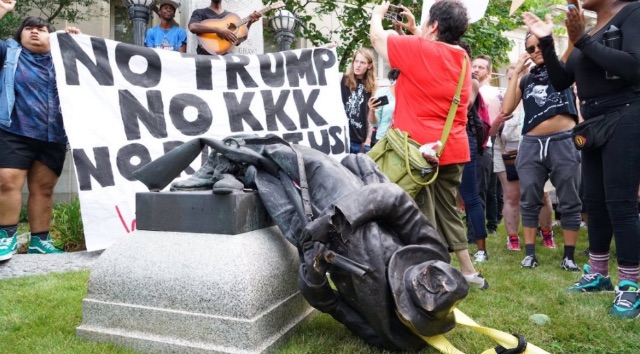
Loan Tran: Gathering that Monday was crucial for so many reasons. For one, a lot of folks had come back from Charlottesville that Sunday and needed a space to be a part of a community. I was definitely feeling a lot of rage. Not being in Charlottesville and getting the updates on what was happening there—like my rage and anger far surpassed my anxiety.
When that statue came down, I was overjoyed. We didn’t expect for that statue to come down and then it did. It was really amazing to be able to share that moment with our folks.
TT: Yeah, it was victorious. The first few days were an emotional rollercoaster, and then a week or two after—I felt free.
LT: Since August, we have wanted to claim the act as a collective win and frame this as a war that we are in. Charlottesville was a flashpoint and then Durham became another flashpoint because we went after white supremacy’s symbolism. It’s like going after the empire’s flag, going after their military bases. The struggle against white supremacy is at that level. In the United States and globally, we are at war.
What has been really fascinating to witness is the position that we have put a lot of local elected officials in city council. The day that the statue came down, the police department released a statement saying they had nothing to do with this and totally pushed the ball in the court of the sheriff’s department. Everyone’s mad at the sheriff’s department. The sheriff’s mad because they couldn’t get a raise because people have been mad at them over jail conditions and ICE detainers. We are really dealing with a lot of wonderful opportunities to connect all types of struggles in Durham. It is so crucial for us when we talk about tearing down white supremacy that we are addressing all attacks on our communities.
TT: One of the things I talk about and which doesn’t get reported, is that even though this action was a step towards political freedom, you can’t have political freedom without economic freedom as well. Making the connection between political freedom and economic freedom goes a long way to drawing the dots to white supremacy and not just the Confederacy.
LT: Politically, it was a really good way to show people what’s possible. We do not have to wait for laws to change for people to get organized and take action. I think that’s one of the most important things about being an organizer—a part of our job is to show our people that not only do we have to fight, we can fight. Not only do we have to be organized, we can get organized.
Takiyah, how did you feel about all these articles coming out placing you in the ranks of Alicia Garza and queer black women who “founded” the Black Lives Matter movement? And then having Solange call you her “hero” on Twitter? Did you tweet back? What happened?
TT: Remember? She deleted her twitter right after! She was like, this is my last tweet before I delete. But yeah, the Solange tweet was cool. Everyone texted me that night and I was like, “Thank you, saw that!”
Being compared to Alicia Garza and other black women leaders in the movement has been kind of weird. You would think that it would be more positive but I feel like the stress and the pressure is huge now. People are focusing on an event rather than the sustained force that breathes life into every event, especially considering that I have not been organizing that long. It would do folks a lot of good to understand the difference between sustained efforts and a specific action. I want people to know that it takes sustained effort to give you these moments of action.
LT: Nothing happens within a vacuum. There are actually very few things in the world that happen spontaneously. Capitalism is both a calculated system and a system that relies on a cycle of crisis of boom and bust. It’s the same for organizing.
When the news first broke that Takiyah was arrested, a lot of the comments insinuated that Workers World Party had just let Takiyah get arrested without any preparation. I can’t fault people for jumping to that assumption. That’s how it’s painted by the state and by corporate media—that things just spontaneously happen. That organizers just stand around twiddling their thumbs all day and then decide to do something reckless. I don’t think that as organizers we talk enough about what it takes to organize.
How do you feel about the direction of the movement against white supremacy or imperialism in general?
TT: I couldn’t even tell you. It’s hard for me to conceptualize because I haven’t been organizing for so long, but I’ve been living in this world for so long so I see the fight against white supremacy in everything. In culture, in art, in school, in every facet of life. I don’t like when people boil resistance down to “I’m surviving in this world that wants to see me dead, that’s my resistance.” Yeah it is, but it’s not enough to just live.
LT: There’s lots of opportunities and also challenges in terms of the political grounding and framework of the current fight against white supremacy. There are so many layers—there are the reactionaries that you have to fight against, but there are also the centrists and the liberals who keep moving the center to the right.
For example, we talk to people all the time who think that the topic of getting police out of schools is too radical. But go talk to a kid in high school and ask them what safety means to them or what they need for their education, and I guarantee you no one’s gonna say I want more cops in my schools. They’re gonna complain about how there’s not enough books; they’re gonna complain about how there’s not enough counselors; they’re gonna complain about not having lunch money. If the people say get cops out of our neighborhoods, do that.
Did you both grow up in the South or somewhere else? Has migration or dislocation affected your development as activists?
TT: I grew up everywhere. I’m from here but I lived in Michigan for a while, in Florida, Tampa, and in Atlanta.
When I moved to New York, that’s when I got a better understanding of race and class because I noticed little differences in school experiences across neighborhoods. How come in the suburbs you get real breakfast and real lunch but in the inner city you get garbage? Seeing the difference in funding, and even the disposition of educators helped me at an early age, at 12 or 13, have an understanding of wealth disparities.
LT: I grew up in North Carolina. My family migrated here from Vietnam mostly because their families had nothing before the war. My dad was orphaned. My mom was very poor and I think she finished seventh grade and then she had to start working. My dad had the opportunity to come to the United States and he took it.
I went to schools with a student body that was majority black and Latinx, so a lot of my friends were black and Latinx. When I started organizing, I was getting trained out of black churches. I learned movement songs that are traditional black church songs.
That was an interesting experience as a documented Vietnamese immigrant in this landscape figuring out how to organize and be in solidarity. I was working with undocumented Latinx folks on issues of deportation and access to higher education. I could apply for federal loans to go to college. I wasn’t worried about deportations because they weren’t targeting people with green cards.
Being a Vietnamese immigrant wasn’t enough on its own to legitimize why I was doing this work. I knew that identity informed the work and was important to it, but I was working on issues that didn’t directly impact me. I was doing it anyway because I believed that that’s what we need to do. In the bigger picture, thinking about the working class as a whole, of course these issues impact me. Organizing as a Vietnamese immigrant in North Carolina taught me some of those lessons early on.
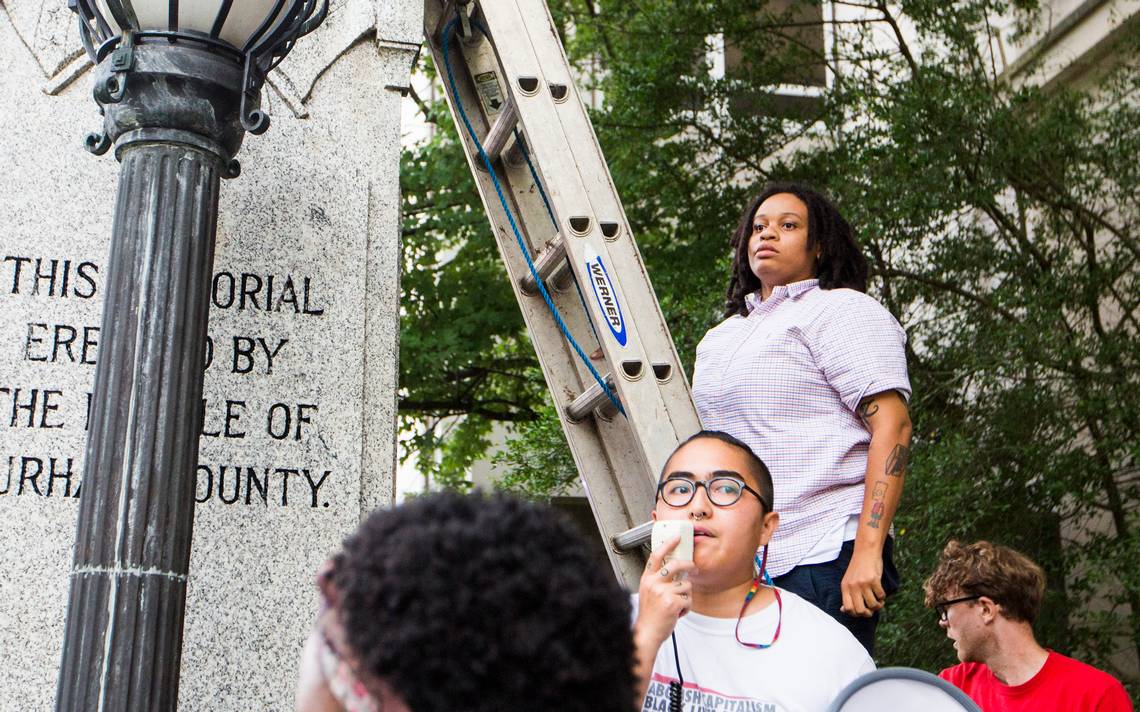
What have you been reading?
LT: I recently finished The Lacuna by Barbara Kingsolver. It’s fiction that is centered around a Mexican boy and the course of his life over thirty or so years. He’s a writer and he finds himself in association with Communists like Trotsky, Frida Kahlo, and Diego Rivera. Part of the novel really resonated with me as a writer and I related to what the main character was trying to do with his writing.
What inspires you in your writing?
LT: I started writing poetry and then for a while I was writing more prose and poetic prose. A lot of the pieces I have written are about very specific moments. I wrote about being a queer, gender nonconforming person that is read by the world as an Asian woman and how that takes shape in my relationship with my mother. She has been a seamstress for over thirty years. She works with women most of the time in the alteration shop. My writing explores that experience within the broader context of imperialism, war, displacement, and migration.
I’ve been writing for longer than I’ve been organizing, and it’s so hard sometimes to take myself seriously as a writer. I’ve had a really hard time writing in the past three years and I recently started again. I have mostly been writing poetry and I put out a chapbook in 2017. It’s called Hold On and I wrote it in honor of the personal and political upheavals in my life.
I take myself very seriously as an organizer and as a Marxist-Leninist, but as a writer I sometimes tell myself, “Your parents didn’t migrate across an ocean so you can sit around and write poems!” I have to stop saying that to myself.
NM: You really have to stop saying that to yourself because writing is also a part of your organizing. Cultural work is so important to what we do as activists. The stories that are told in mainstream media and publishing aren’t usually written by and for working-class and marginalized people, who actually make up the majority of society. We have to tell these stories. Keep writing.
I’m the same way. I have a harder time sharing poetry to eight people in a writing workshop than I do speaking to thousands of people at a rally. I heard a saying once that a poem is to literature as an X-Ray is to medicine. Poetry shows your guts and makes you vulnerable.
TT: You know how I know Loan is a poet? You cried at that weak-ass speech I gave the other day. You found so much sentiment in that little speech.
LT: Well, because it was very earnest and genuine! And sincere. How about you? Are there any books outside of school that you’ve been reading?
TT: Books? I’ve just been dabbling. Wretched of the Earth, but I haven’t finished it. Recently, I picked up Assata Shakur’s biography. In learning how the New Jersey police was founded by a Nazi, I think about how people can understate the conditions that are taking place here in the New York area. People have this idea that we only have segregation in the South, but even in the city, there’s hypersegregation. It’s a separate set of challenges.
LT: Yeah, I think people can easily fetishize the South. It’s different to organize in the South. In the South, there are real differences in terms of demographics, geography, how communities are structured, what white supremacy looks like, how close segregated communities exist by each other. For example, there are historical maps of Durham where right in the middle of a black neighborhood, you have a park that’s for white people only. That’s how the physical landscape is set up. So those things are real and inform our organizing in necessary ways.
When folks don’t actually understand the material conditions, they can paint a fantasy that the South is in such dire crisis, and everyone who does any work there is a hero. It’s not really helpful because it makes it harder for us as organizers in the South to reflect and learn from mistakes.
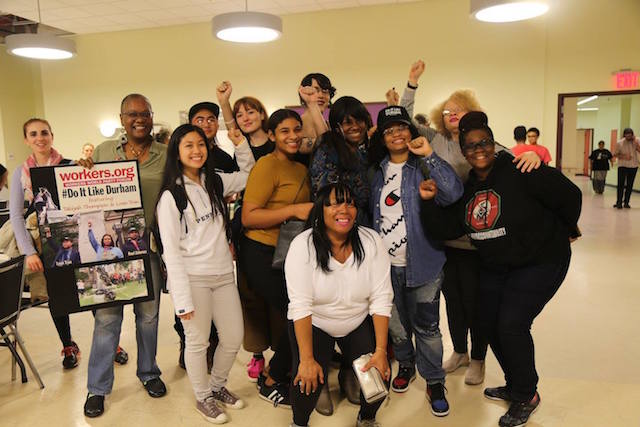
Queer people of color have historically been at the forefront of social movements. What would you want young queer people of color to know about organizing or the world in general that you wish you knew when you were younger?
LT: One of the biggest things for me is learning how to pick your battles. The movement is a complicated space. We’re human. We all have baggage. We all have our own personal contradictions. I wish I had known that the movement is not a perfect place when I started organizing, but we have to figure out how to deal with that because there’s a greater purpose. There’s a greater vision that we’re all fighting for.
For example, it becomes really easy to always rail against white people. But after a certain point, what’s the political use or political value of just talking about white privilege all the time? What does that actually do? I’ve taken that to heart because we’ve got a lot of work to do. And it’s work that has a lot of urgency. How do we focus on building unity and solidarity and strengthening our relationships to each other?
That is not to say that white folks don’t annoy me or men don’t annoy me. But if we’re in this, we’re in this. If we’re comrades, we’re comrades. If we’re in the struggle together, we’re in the struggle together.
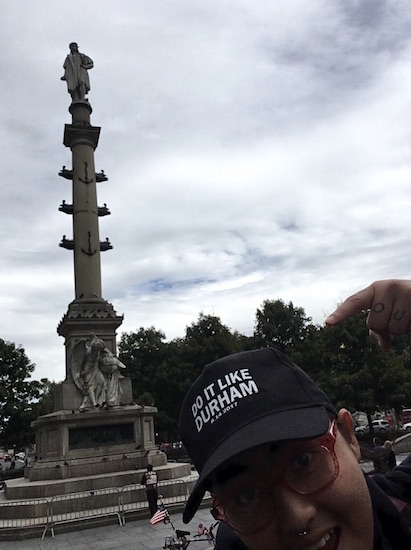
Are you going on tour now as part of the Do it Like Durham campaign?
LT: You mean like a toppling racism tour? Where we drive around the country and tear down things?
Sure, I mean we’re close to the Columbus statue on 53rd!
TT: We’d need a crane. And by the time we get a crane to 60th Street, I think we’re gonna be found out.

